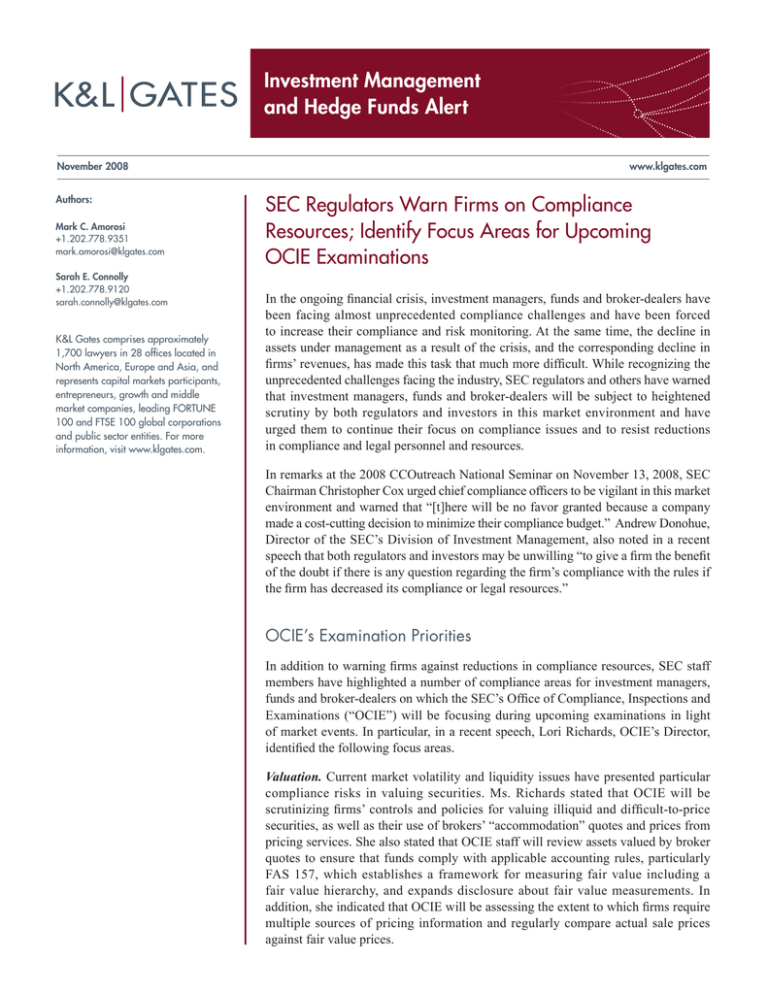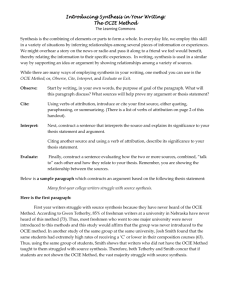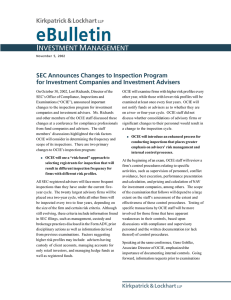
Investment Management
and Hedge Funds Alert
November 2008
Authors:
Mark C. Amorosi
+1.202.778.9351
mark.amorosi@klgates.com
Sarah E. Connolly
+1.202.778.9120
sarah.connolly@klgates.com
K&L Gates comprises approximately
1,700 lawyers in 28 offices located in
North America, Europe and Asia, and
represents capital markets participants,
entrepreneurs, growth and middle
market companies, leading FORTUNE
100 and FTSE 100 global corporations
and public sector entities. For more
information, visit www.klgates.com.
www.klgates.com
SEC Regulators Warn Firms on Compliance
Resources; Identify Focus Areas for Upcoming
OCIE Examinations
In the ongoing financial crisis, investment managers, funds and broker-dealers have
been facing almost unprecedented compliance challenges and have been forced
to increase their compliance and risk monitoring. At the same time, the decline in
assets under management as a result of the crisis, and the corresponding decline in
firms’ revenues, has made this task that much more difficult. While recognizing the
unprecedented challenges facing the industry, SEC regulators and others have warned
that investment managers, funds and broker-dealers will be subject to heightened
scrutiny by both regulators and investors in this market environment and have
urged them to continue their focus on compliance issues and to resist reductions
in compliance and legal personnel and resources.
In remarks at the 2008 CCOutreach National Seminar on November 13, 2008, SEC
Chairman Christopher Cox urged chief compliance officers to be vigilant in this market
environment and warned that “[t]here will be no favor granted because a company
made a cost-cutting decision to minimize their compliance budget.” Andrew Donohue,
Director of the SEC’s Division of Investment Management, also noted in a recent
speech that both regulators and investors may be unwilling “to give a firm the benefit
of the doubt if there is any question regarding the firm’s compliance with the rules if
the firm has decreased its compliance or legal resources.”
OCIE’s Examination Priorities
In addition to warning firms against reductions in compliance resources, SEC staff
members have highlighted a number of compliance areas for investment managers,
funds and broker-dealers on which the SEC’s Office of Compliance, Inspections and
Examinations (“OCIE”) will be focusing during upcoming examinations in light
of market events. In particular, in a recent speech, Lori Richards, OCIE’s Director,
identified the following focus areas.
Valuation. Current market volatility and liquidity issues have presented particular
compliance risks in valuing securities. Ms. Richards stated that OCIE will be
scrutinizing firms’ controls and policies for valuing illiquid and difficult-to-price
securities, as well as their use of brokers’ “accommodation” quotes and prices from
pricing services. She also stated that OCIE staff will review assets valued by broker
quotes to ensure that funds comply with applicable accounting rules, particularly
FAS 157, which establishes a framework for measuring fair value including a
fair value hierarchy, and expands disclosure about fair value measurements. In
addition, she indicated that OCIE will be assessing the extent to which firms require
multiple sources of pricing information and regularly compare actual sale prices
against fair value prices.
Investment Management and Hedge Funds Alert
Money Market Funds. Recent market events have
had a particularly significant impact on many money
market funds. While the SEC staff has taken a series
of actions to help alleviate stress on these funds, Ms.
Richards indicated that OCIE examiners will be
focusing on money market funds’ compliance with
shadow pricing procedures and related requirements
of Rule 2a-7 under the Investment Company Act of
1940. She also stated that examiners will review
firms’ compliance with Rule 2a-7’s requirements
relating to the creditworthiness of portfolio securities.
In addition, she indicated that OCIE examiners
will be trying to determine if money market fund
managers are attempting to boost yield by exposing
their funds to excessive undisclosed risk.
Short Selling. Over the past few months, the SEC
has responded to recent market events with new
temporary reporting regulations and anti-fraud
measures targeting short selling. Ms. Richards
emphasized that firms should ensure they are
complying with these new disclosure rules, in
addition to the requirements under Regulation
SHO, and indicated that OCIE will be focusing on
firms’ compliance with these requirements during
examinations. She also indicated that examiners
will be reviewing firms’ policies and procedures
for preventing employees from knowingly creating,
spreading or using false or misleading information
with the intent to manipulate securities prices.
Portfolio Management, Brokerage Arrangements
and Best Execution. Portfolio management,
brokerage and best execution issues also will be
focus areas for OCIE examiners, according to
Ms. Richards. In the portfolio management area,
examiners will review whether portfolio managers
are trading more aggressively or deviating from
their funds’ investment objectives and policies as
disclosed in their prospectuses and private placement
memoranda in an effort to recoup losses. In the
brokerage area, OCIE will be focusing on the use
of affiliated broker-dealers and any undisclosed
relationships with broker-dealers for excessive
commissions, kickbacks and other conflicts of
interest. In addition, examiners are expected to
focus on Regulation NMS and direct market access
arrangements; whether brokerage arrangements
are consistent with disclosures; whether soft
dollars are used appropriately and in accordance
with disclosures; and whether the firm seeks
best execution.
Supervision. In the broker-dealer area, Ms. Richards
stated that OCIE examiners will be focusing
on supervisory procedures and practices at the
branch offices of broker-dealers and bank brokerdealers; supervision and control over traders and
producing branch managers; and firms that advertise
themselves as allowing maximum independence
to registered representatives. OCIE examiners
also will look for abuses in transferring customer
accounts when registered representatives move to
new firms and the adequacy of firms’ testing for
unsuitable or aberrant trades.
Suitability of Investments for Clients and
Disclosure. Ms. Richards also stated that OCIE
staff will target structured products and other
investments purchased for clients to verify they
are consistent with disclosures, client investment
objectives and restrictions, investment guidelines in
investment advisory agreements and the obligation
to recommend only securities that are suitable or
appropriate. She noted that OCIE staff will give
particular focus to firms’ interactions with clients
who are seniors. She suggested that, in preparing
for an inspection, compliance personnel should
check Form ADV disclosures, fund prospectuses,
private placement memoranda, marketing materials
and any other information provided to clients for
adequacy and accuracy with regard to credit risk
and liquidity. She also suggested that compliance
personnel should review disclosure materials to
ensure they are consistent with any measures taken
by firms in response to the credit crisis. She noted
that OCIE examiners will pay particular attention
to how firms present their advertised performance
figures and their participation in investor protection
programs, such as SIPC and the Department of
the Treasury’s Temporary Guarantee Program for
Money Market Funds.
Financial Controls. Also in the broker-dealer area,
OCIE examiners are expected to focus on firms’
compliance with net capital and customer control
requirements and risk management and internal
control procedures.
November 2008 | 2
Investment Management and Hedge Funds Alert
Other Focus Areas for OCIE
Ms. Richards also identified a number of other
areas of concern that, while not directly related to
the current market crisis, will be focus areas for
OCIE examiners during upcoming inspections. They
include the following:
Controls to Prevent Insider Trading. OCIE will
continue the SEC’s agency-wide effort to combat
insider trading by evaluating the adequacy of firms’
policies and procedures against insider trading and
their information barriers and controls to prevent
insider trading and the leakage of information. OCIE
also will be focusing on the identification of sources
of material non-public information, surveillance,
physical separation and written procedures.
Undisclosed Payments. OCIE examiners also will
be on alert for undisclosed compensation or payment
arrangements with third parties that are not properly
disclosed, such as revenue sharing, compensation
arrangements for referrals or other payments made
to increase sales or assets under management. In
her speech, Ms. Richards stated that undisclosed
payments could include fund networking fees or
payments by advisers to broker-dealers to be added
to the firms’ recommended adviser or hedge fund
list, and might involve kickbacks from a service
provider or the misappropriation of assets through
fictitious bills and expense items.
Corporate Governance. Another focus area for
OCIE will be mutual fund firms’ compliance with
board composition requirements. In particular, OCIE
will be checking to confirm that mutual funds have
properly constituted boards and have considered
required matters.
Safety of Customer Assets. The safety of customer
assets also will continue to be a focus area for OCIE,
which will review the effectiveness of firms’ policies
and procedures for safeguarding client assets from
theft, loss and misuse, and firms’ compliance
with Regulation S-P, which protects the privacy
of customer information. Among other areas, Ms.
Richards indicated that OCIE will review whether
client funds are held by qualified custodians and
will assess whether there are adequate controls to
prevent the interception or falsification of account
statements to clients.
Anti-Money Laundering. OCIE also will be
targeting mutual fund firms’ and broker-dealers’
anti-money laundering programs. Ms. Richards
indicated that examiners will be reviewing firms’
policies in this area and assessing their effectiveness
and whether actual practices are consistent with
those policies.
OCIE Releases Core Initial Request for
Investment Adviser Examinations
In a related development, OCIE recently published
the core initial request for information that it will use
in connection with investment adviser examinations.
The document is available on the SEC’s website at
http://www.sec.gov/info/cco/requestlistcore1108.htm.
The request letter identifies the information that
OCIE will request from advisers that provide only
traditional money management services to non-fund
clients. According to the release, OCIE will request
additional information if an adviser engages in
additional businesses, such as advising mutual funds
or private funds, participating in wrap fee programs,
participating in PIPES offerings or if the adviser
is also a registered broker-dealer. The document
focuses on core regulatory areas for investment
advisers and can serve as a useful starting point to
prepare for an adviser examination.
Conclusion
It appears that the SEC’s examination program will
be very active as the market turmoil continues to
unfold. Thus, firms should be prepared for more
scrutiny from the SEC staff in connection with
examinations, and potentially a more aggressive
stance on any deficiencies that the staff identifies.
November 2008 | 3
Investment Management and Hedge Funds Alert
K&L Gates comprises approximately 1,700 lawyers in 28 offices located in North America, Europe and Asia, and represents capital markets
participants, entrepreneurs, growth and middle market companies, leading FORTUNE 100 and FTSE 100 global corporations and public sector
entities. For more information, visit www.klgates.com.
K&L Gates comprises multiple affiliated partnerships: a limited liability partnership with the full name K&L Gates LLP qualified in Delaware and
maintaining offices throughout the U.S., in Berlin, in Beijing (K&L Gates LLP Beijing Representative Office), and in Shanghai (K&L Gates LLP Shanghai
Representative Office); a limited liability partnership (also named K&L Gates LLP) incorporated in England and maintaining our London and Paris
offices; a Taiwan general partnership (K&L Gates) which practices from our Taipei office; and a Hong Kong general partnership (K&L Gates,
Solicitors) which practices from our Hong Kong office. K&L Gates maintains appropriate registrations in the jurisdictions in which its offices are
located. A list of the partners in each entity is available for inspection at any K&L Gates office.
This publication is for informational purposes and does not contain or convey legal advice. The information herein should not be used or relied upon
in regard to any particular facts or circumstances without first consulting a lawyer.
©1996-2008 K&L Gates LLP. All Rights Reserved.
November 2008 | 4







